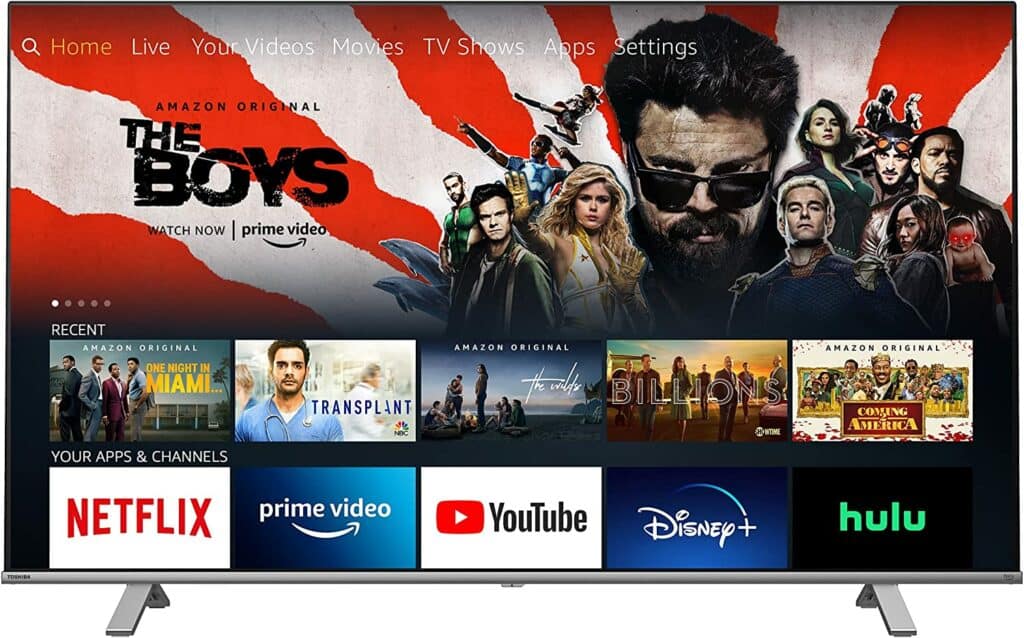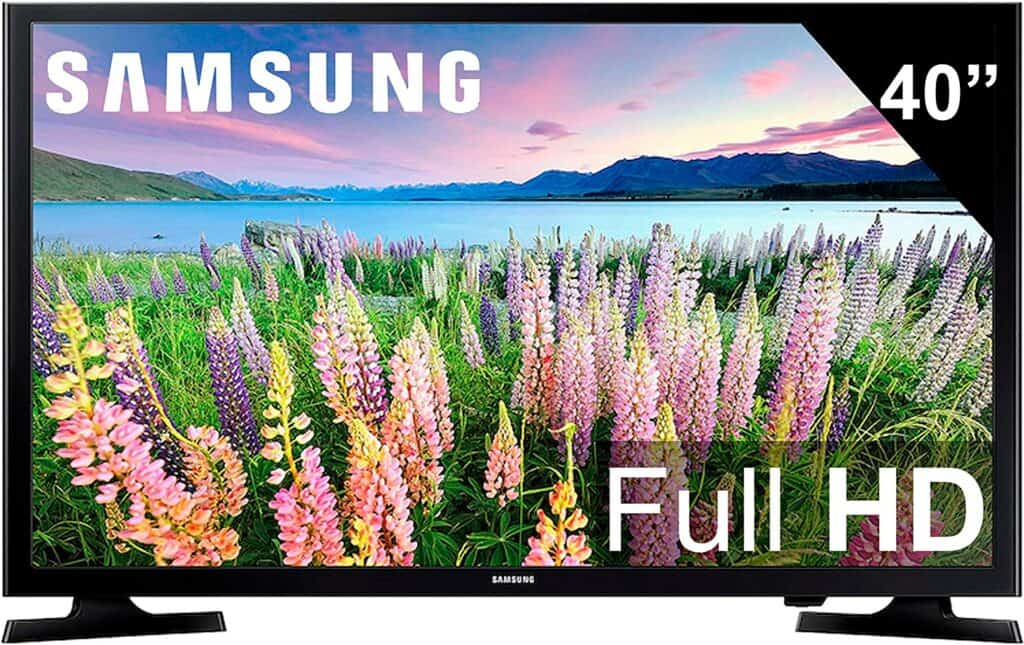While there are many TV brands on the market — in this Toshiba vs Samsung TV article, we compare two of the more popular brands out there. These two manufacturers produce a wide range of TVs, from budget options to expensive high-end premium models. We will present an overview of both brands and compare their most important features. Keep reading to find out more about these dueling brands.
Toshiba vs samsung tv quick comparison
Toshiba is a Japanese firm that has existed since the 19th century (1875, to be precise). Since 2017, its television business has been controlled by the Chinese company Hisense as Toshiba moved out of many B2C businesses. They are also known for making Fire TV devices that use Amazon’s platform.
Samsung is an electronics manufacturer from South Korea. They make a wide range of TVs, from 1080p resolution all the way up to 8K. In addition to TVs, they make other electronic appliances such as tablets, smartphones, washing machines, fridges, etc.
In general, Toshiba offers budget to mid-range TVs, whereas Samsung’s offering includes high-end, cutting-edge TVs. Even though Toshiba has some high-end models, they are known to be a more budget-friendly TV brand.
Toshiba televisions
Pros:
- Refresh rate up to 120 Hz
- 4K resolution
- More affordable
- Great sound quality
Cons:
- Brightness levels
- No HDMI 2.1 support
Samsung TV
Pros:
- Quantum dot panel technology
- 8K resolution
- Superb brightness
- Fantastic reflection handling
Cons:
- No Android OS support
- More expensive
Features face to face
Panel Technology
Toshiba mostly uses LED panels on their TVs, but they also offer OLED TVs. The main difference between these panels is that LED uses backlighting, whereas OLED panels don’t.
As a result, OLED or Organic Light-Emitting Diode panels offer better picture quality and better viewing angles. But LED TVs are brighter and often cheaper.
Samsung, on the other hand, uses QLED or Quantum-Dot LED technology. It is a variation of LED technology in which quantum dot film is added to the LED sandwich to boost color and brightness.
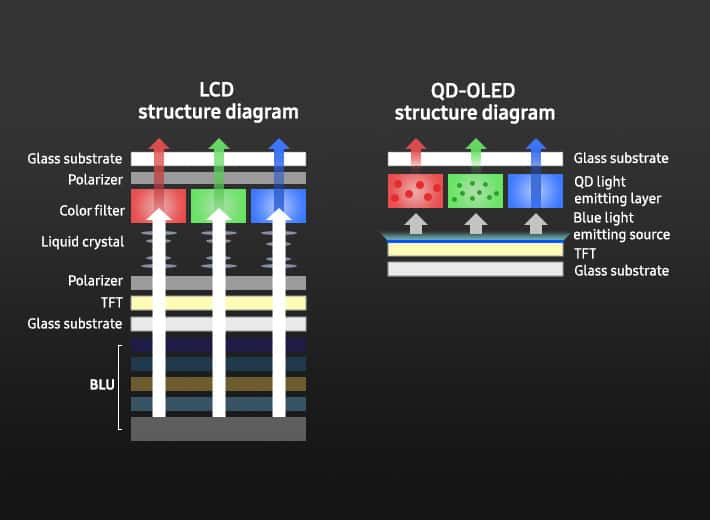
Of course, Samsung also offers OLED TVs. But it includes the newer type of panel — QD-OLED or Quantum Dot OLED. It combines OLED technology and quantum dot technology. As a result, you get an OLED TV with fantastic brightness levels.
Winner: Samsung TV
Image Processor
Most Toshiba TVs come with a CEVO ENGINE image processor. This processor is developed by Toshiba for TV use. It helps with image quality improvements and 3D functions.

The newer generation of Toshiba processors come with better upscaling features. The CEVO 4K processor increases color details and gradation, improves sharpness, and helps with contrast management and noise reduction.
Samsung TVs come with Neo Quantum Processor, which boasts an AI upscaling feature. It helps the TV deliver better image quality with a low-res input.
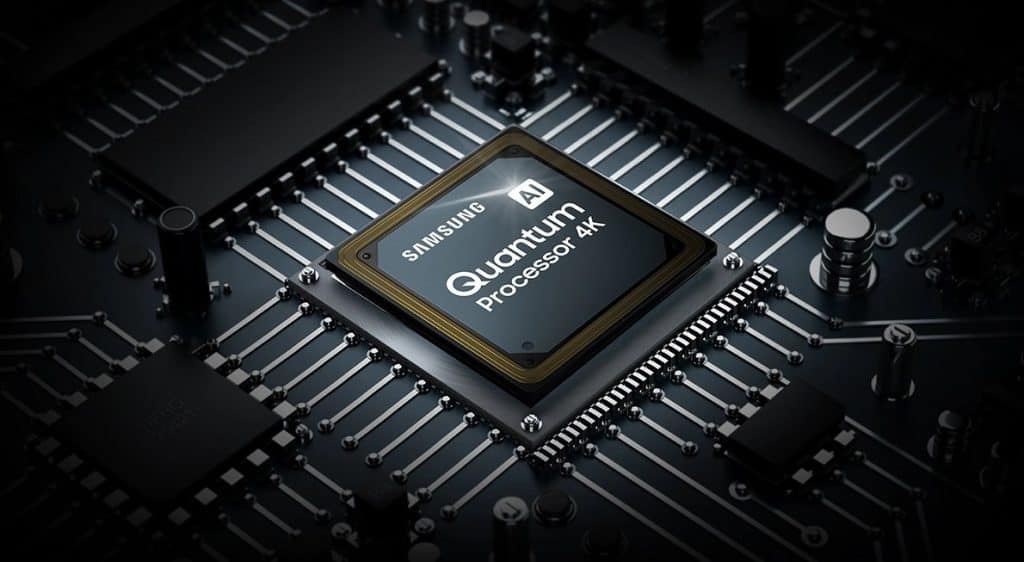
But more recent TV models also come with Neural Quantum Processor 4K. It is basically an improved version of the Neo Quantum Processor.
Winner: Draw
Motion Technology
Motion handling is just as important as resolution or screen size. How the TV handles motions can significantly impact your watching or gaming experience. The refresh rate on each TV model reflects how that TV handles motions. The refresh rate can go all the way up to 240 Hz.
However, most TVs today have either 60 Hz or 120 Hz refresh rate. And Toshiba and Samsung TVs are no different; you can find these TVs with either 60 Hz or 120 Hz.
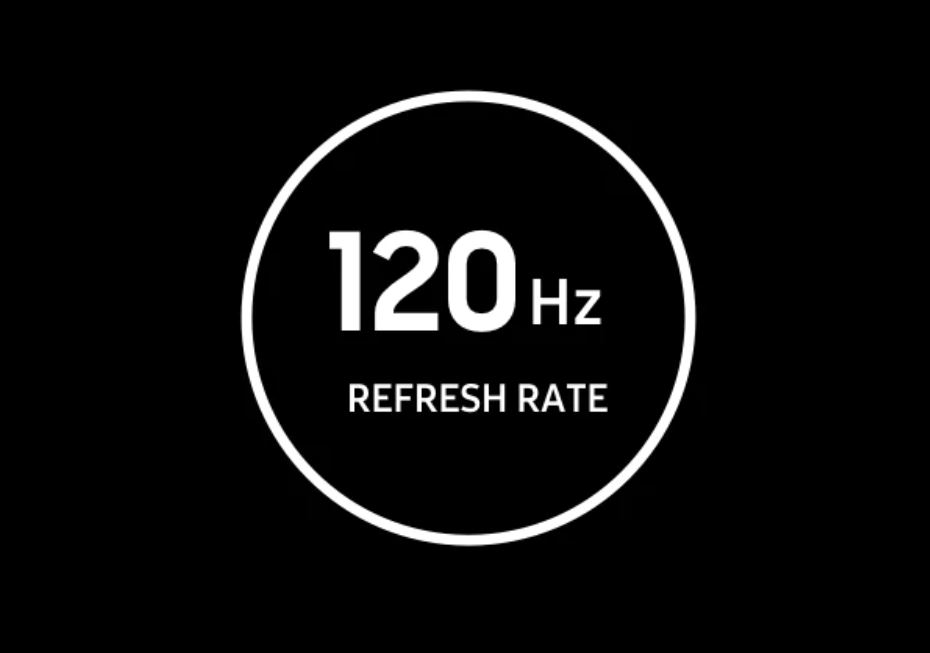
But if you intend to use your TV for gaming, make sure to do detailed research when choosing a model. You should consider other factors, such as response rate, input lag, and variable refresh rate. However, these features differ from model to model, and that’s why detailed research is a must.
Winner: Draw
Picture Quality
When evaluating picture quality, you should not only look at the resolution — you also need to take refresh rates into account. Since it is a budget-friendly brand, Toshiba offers a wide range of resolutions, from HD Ready to the UHD 4K resolution.
On the other hand, Samsung also offers a wide range of resolutions. However, they offer 8K TV models, which Toshiba doesn’t.
Winner: Samsung TV
Contrast Ratio / Black Level
The contrast ratio represents the ratio between the brightest white and the darkest black. The higher the contrast ratio, the better display of deep blacks. When the contrast ratio is high, there is no blooming around bright objects and highlights.
Some brands, such as LG, offer a near-infinite contrast ratio. The TV brands in our Toshiba vs Samsung TV comparison don’t have a near-infinite contrast ratio; however, they still offer a great contrast ratio. But neither of them stands out in this category.
Winner: Draw
Local Dimming
The local dimming feature is a way to improve the contrast ratio on your TV model. So, it can make blacks deeper, especially in dark scenes when you watch TV in a dark room.
Toshiba TVs come with the TRU Micro Dimming, which can help improve the image contrast, produce deep blacks, and increase details in dark and bright scenes. Samsung TVs usually come with full-array local dimming features.
So, each brand offers its own version of local dimming technology to improve the contrast ratio.
Winner: Draw
Peak Brightness
Toshiba TVs are not exactly known for their brightness. Their LED TVs have decent brightness levels. Their OLED TVs, just like OLED TVs in general, don’t get as bright as LED TVs.
On the other hand, Samsung has fantastic brightness levels. Their quantum dot technology improves color accuracy and brightness levels. As a result, their QLED TVs are brighter than other LED TVs. They are brighter than other OLED TVs on the market, as well. So, Samsung TVs excel in this category.
Winner: Samsung TV
Color
Toshiba high-end TVs have a wide color gamut and great color accuracy. They also come with Dolby Vision HDR, which improves color features. However, this is not exactly the case with cheaper models. So, if you want to enjoy great colors on a Toshiba TV, you should get one of the high-end models.
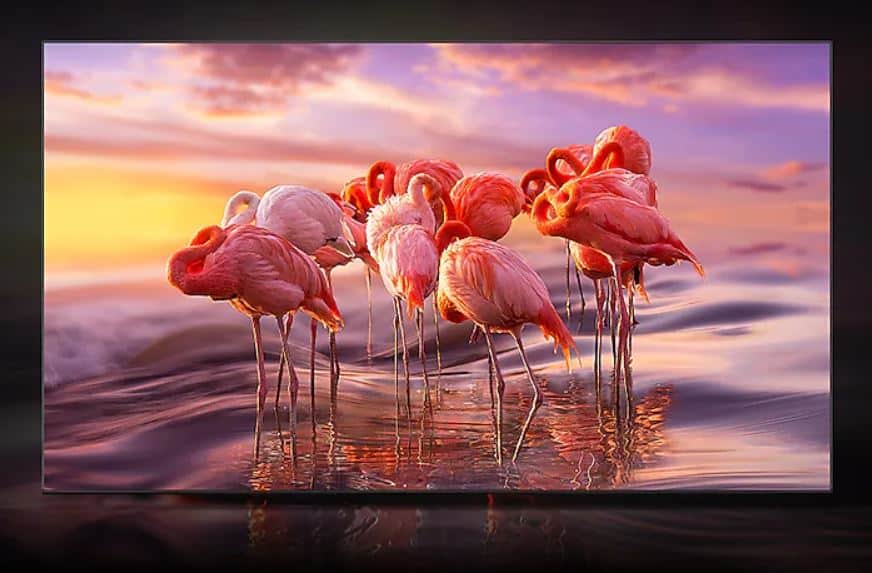
Samsung TV models usually have a wide color gamut and great color volume. Some models might struggle with displaying darker shades of color due to the lower contrast ratio. But in general, Samsung TVs offer better color features.
Winner: Samsung TV
Viewing Angle
Toshiba OLED TVs offer great viewing angles. Overall, Toshiba improved its viewing angles over the years, but it has struggled in the past.
Samsung TV also doesn’t excel in this category. Their TV models come with decent viewing angles. But they made efforts to improve in this segment with the “Ultra Viewing Angle” layer.
Winner: Draw
Reflections / Anti-Glare
Reflection handling matters when you watch the TV in a brighter environment or when there is a light source on the opposite side. Toshiba TVs do a good job in this segment. Again, the premium models are better, whereas budget Toshiba models might not fight glare well.
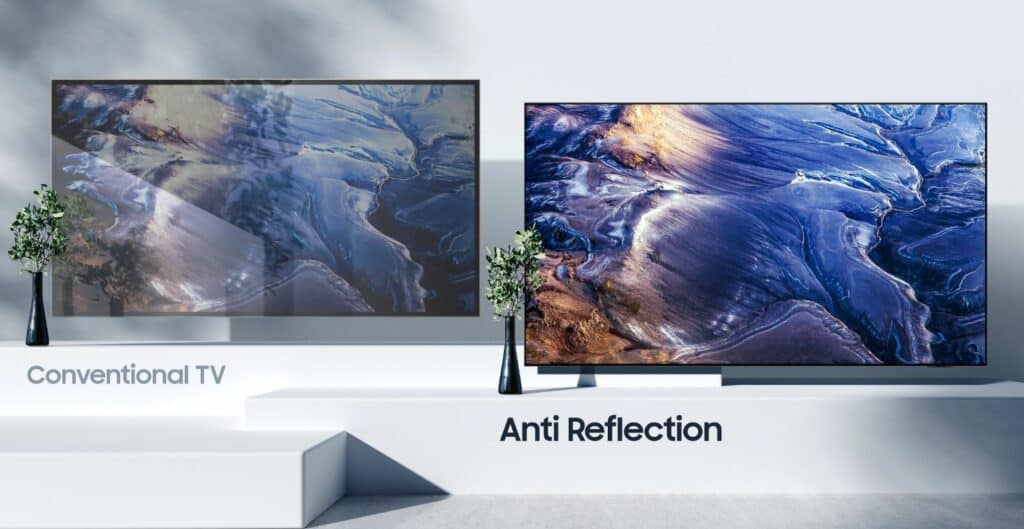
But Samsung TVs are superb at reflection handling. They have either a glossy or semi-glossy finish which is a good choice for reflection handling.
Winner: Samsung TV
Sound Quality
Sound quality is an integral part of the TV experience. Some manufacturers put a lot of effort into providing stunning sound. But most manufacturers opt for average speakers and solid sound.
The reason behind it is that providing good sound will significantly increase the price of the TV. Modern TVs are also very thin, making it difficult to place speakers large enough to provide great sound. And lastly, this aspect is easily upgradeable via a soundbar.
For that reason, usually, only premium models have fantastic sound features. But that doesn’t mean that all mid-range and budget TVs lack sound quality.
Toshiba does a good job when it comes to speakers. They come with Dolby Audio Processing technology and Onkyo speakers. Their premium models have up to 42W speakers.
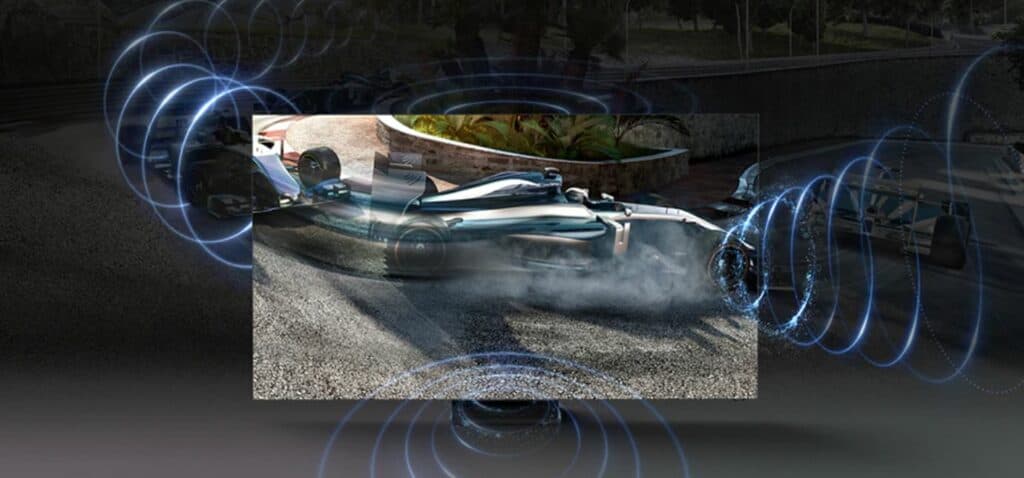
Samsung TVs also come with excellent sound quality. They have Object Tracking Sound (OTS) feature that optimizes the sound by analyzing the content. You can always upgrade sound features with Samsung soundbars.
Winner: Toshiba
Smart TV Platform (Operating System)
Toshiba TV models come with Android TV, Fire TV, or VIDAA OS. Samsung, on the other hand, runs on Tizen OS. Fire TV is an Android-based OS, while Tizen and VIDAA are both Linux-based operating systems.
Tizen has a user-friendly interface — however, Android performs better when it comes to voice assistance, app support, and gaming. So, it has a slight advantage.
Winner: Toshiba
Connectivity
Inputs
Toshiba TVs, on average, come with two to four HDMI ports and one or two USB ports. The same goes for Samsung TVs. But these two differ when it comes to HDMI type.
HDMI 2.0 is the most common port on TVs. And HDMI 2.1 is a better choice for gaming since it supports higher resolutions and frame rates. Unfortunately, Toshiba only offers one TV that supports HDMI 2.1.
Samsung stands a bit better in this segment. They have numerous TVs that support HDMI 2.1, such as Samsung S95B, Samsung QN85A, or QN90A.
Winner: Samsung TV
Voice Assistants
Toshiba TVs support Google Assistant and Amazon Alexa. Samsung TVs also support these two voice assistants. However, they additionally come with Samsung’s digital assistant Bixby.
Winner: Samsung TV
Wireless Technologies
Like most TVs on the market today, TV models in our Toshiba vs Samsung TV comparison support Wi-Fi connectivity (2.4GHz and 5GHz).
Winner: Draw
Price
Toshiba is known as a budget-friendly TV brand, but Samsung also has budget-friendly TV options. However, Samsung has more premium models that can cost thousands of dollars.
Even though it may be good for the wallet, buying a budget TV means you have to give up certain features. It depends on how much or how many features you are willing to give up for a good price.
Therefore, it is crucial to do thorough research before purchasing a TV.
Conclusion
In our Toshiba vs Samsung TV comparison, both TV brands have their own strengths. Both brands offer both cheap, mid-range, and premium models.
Toshiba offers lots of budget-friendly TV options. Their TVs offer great colors and contrast ratio with local dimming features. They also have great image processors, motion-handling features, and great speakers.
Samsung TVs come with quantum dot technology that improves colors and brightness. They come with a variety of supported resolutions, going all the way up to 8K. If you opt for a Samsung TV, you can count on fantastic reflection handling, a big choice of voice assistants, and a large number of ports.
